We use cookies to ensure that we give you the best experience on our website. If you continue to use this site we will assume that you are happy with it
Background Check: Oregon Guide (Special Rules Explained)
 Written by Background Check Repair
Written by Background Check Repair
Background Checks | June 10, 2024
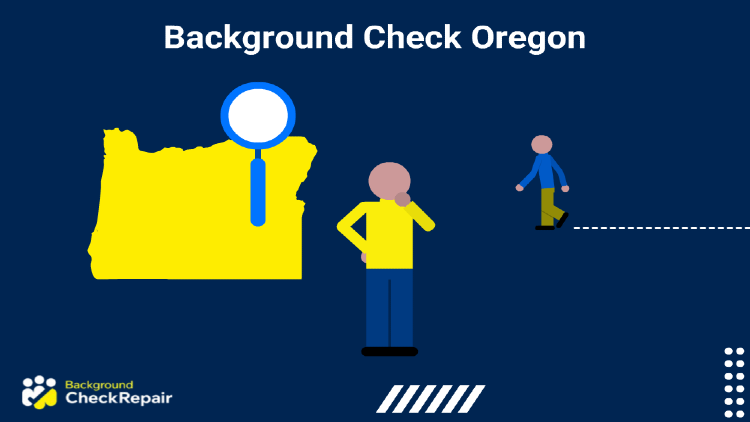
Table of Contents
When conducting a background check, Oregon has special rules and laws concerning employment. Background checks are a must for any employer in the state, but this can be difficult to navigate the equal opportunity regulations when dealing with applicants with a criminal history.
Oregon has strict laws and special rules about pre-employment screening and employers must follow them closely or risk penalties and fines. When running a background check, Oregon ban the box law and its pay equity law must be understood to effectively avoid liability and violations.
The ban the box law is a great example of how the state is proactive about making sure all people have an equal opportunity regardless of whether they’ve been convicted before or not.
However, when a background check becomes necessary for employment (i.e., after an in-person interview), then Oregon gives applicants and employees some extra protection that you won’t find with other states’ laws.
Pay equity laws in Oregon protect the rights of workers by ensuring applicants are not discriminated against because of wage-related issues. This includes both past and present compensation.
In order to keep up with changing laws and enforcement of these laws, anyone involved in hiring workers must stay abreast of all updates to protect their company from enforcement actions.
Understanding Background Checks in Oregon
In Oregon, background checks are a must for any employer. If you’re looking to hire someone in the state of Oregon, make sure you follow these laws and regulations concerning employment screenings:

- There are laws about how an employer can screen potential applicants based on criminal history. Employers cannot ask applicants about their criminal history until the actual interview process has begun.
- Employers should not discriminate against those with past convictions unless there is reasonable cause related to safety concerns in the workplace or the nature of the position.
- Employers cannot request applicants’ credit history for employment purposes unless such a report is meaningfully related to the position being offered. Written notice for the report must be provided and the search should be conducted in compliance with state law.
- Oregon businesses should inform all prospective employees about any pre-employment inquiries into criminal history, and provide a written copy of the report to all applicants once a hiring decision has been made.
- Employers must conduct background checks in compliance with state laws so as not to violate employees’ rights under any federal or state law that prohibits employment discrimination.
- Applicants have rights when it comes to having their information from previous jobs verified by future employers.
It is illegal for employers to:
- Ask about criminal history before a job interview has taken place.
- Consider any arrests in employment decisions without reasonable cause related to the position being offered.
- Refuse to hire someone because they have been convicted of a felony unless there are specific circumstances relevant to the position that warrant such action (e.g., if you’re applying for a teaching position, you cannot be considered for employment if you have been convicted of a sex crime).
- Consider wage history in the hiring process. This includes such information from previous employers and compensation (both present and past, unless there is a lawful reason to do so).
The following things should be considered when conducting Oregon background checks:
- Job applications cannot include questions regarding past drug use or treatment; however, this may be asked once a job offer has been made and is conditional upon the results of a drug screening.1
- Always verify any information provided by applicants to ensure its accuracy before making hiring decisions based on such data.
- Employers should not ask about an applicant’s health or disabilities until after you’ve extended them a job offer. This includes both past and present medical conditions. Businesses cannot discriminate against people with disabilities or health conditions, including those who take medication related to a medical condition. This also includes mental and psychological conditions as well as physical ones.
- Oregon employers must comply with ADA regulations when it comes to employees and health conditions. If you have a mental or psychological condition, employers cannot discriminate against hiring you because of it.
- Employers should only inquire about criminal convictions that are relevant to the position after the application process is complete.
Oregon’s Revised Statutes regarding criminal record checks can be found in ORS 181A.220. These statutes, which include enforcement and penalties, may be located on the Oregon Legislature website. These laws cover all employees who work for businesses within the state of Oregon, although additional provisions may apply to those seeking employment in some sectors, such as health care or child care safety.
The following resources should help employers understand their legal responsibilities concerning a background check, Oregon laws, and regulations:
- Oregon Bureau of Labor and Industries (BOLI) provides information on the rights of employees, including those with disabilities.
- Oregon Department of Justice offers enforcement services related to background checks for employers who are unable or unwilling to conduct their own investigations. The DOJ also maintains a complaint coordinator who can provide advice regarding discrimination in hiring practices.
- U.S. Equal Employment Opportunity Commission (EEOC) is the federal enforcement agency responsible for investigating claims of discrimination in regard to background checks.
- Human Rights Commission (HRC) investigates complaints regarding hiring practices and Oregon background check procedures that violate state laws. This office may also be able to provide guidance on how best to conduct a certain type of investigation or confirm an employer’s compliance with federal and state laws.
- Oregon Employment Department provides information regarding hiring guidelines and enforcement services for those who believe that they have not been treated fairly during an investigation.
How To Access Public Records With a Background Check
There are various ways to uncover public records via background checks. In Oregon, the police department provides a list of all arrests and convictions that took place within their jurisdiction. This may include traffic violations such as driving under the influence (DUI) and other citations as well. Online background check companies request access to these records in order to provide information about your criminal history to employers and other interested parties.

Some people worry about revealing past mistakes to potential future employers or landlords; however, others feel that there is no harm in checking. The choice to use a background check service or not depends on whether the potential repercussions can negatively influence your life.
If you are interested in looking at your own criminal history, you can request a copy of your criminal history record information from the Oregon State Police. You will need to pay $33 for each individual report that you order and complete the appropriate forms required by law enforcement agencies in the state. This information is confidential and will not be revealed to any third parties except where provided for by law or statute.
If you would like someone else’s criminal history, the Oregon State Police requires that you submit a written request either by mail or electronically before they will provide information about another individual. The process is different depending on who wants the record and what purpose it serves. For example, in cases of prospective employees, an employer must first notify an individual before a request can be made.
Employers should only check criminal histories if they are relevant to specific positions, such as those requiring security clearance or other sensitive roles. Oregon Statutes and Administrative Rules govern the enforcement of criminal background checks in Oregon for private employers, as well as those seeking employment with local or state government agencies.
If you are interested in learning about what is available publicly in your criminal history regardless of whether or not anyone actually has access to it, then an online background check service may be useful. They can also provide information about your court records, including cases filed against you and the final outcome of those proceedings.
Background check services vary in terms of the information that they can provide, as well as how much information is available or not. In order to ensure a comprehensive report, you should use an official service rather than relying on free services. While free background checks are available, these sites will often have limited access to legal records. Further, the information provided by these websites may be unreliable. Inaccurate information and omissions can be falsely included in background reports when providers do not access official records themselves.
Some companies who offer free background checks actually use your information for marketing purposes rather than to provide information about your background. Before using one of these services, it is important to read through any terms and conditions carefully in order to avoid having your data sold to third-party companies. The best way to avoid these types of complications is to visit a reputable company that has no interest in selling your data or using it for marketing purposes.
What Oregon Court Records Are Available?
A common question that many job seekers may have is “What are court records?”. Court records consist of everything from criminal convictions to arrests, charges, and warrants stemming from any local, state, or federal law enforcement agency. In addition to criminal records, Oregon court records may also consist of civil cases such as divorces and child custody hearings.
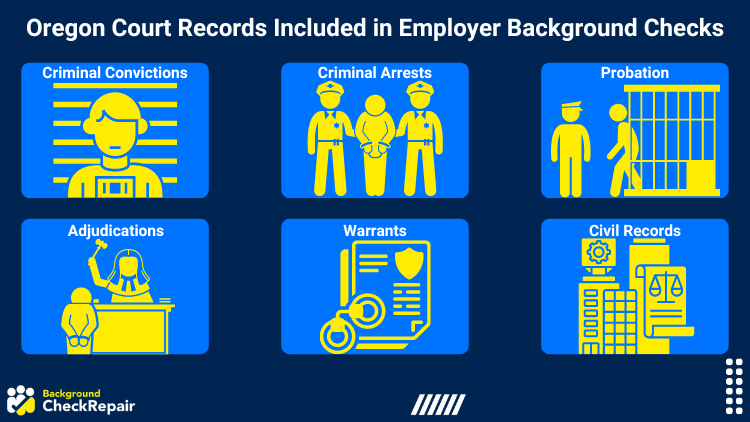
From these sources of information, an employer can determine if someone is a fit for their company. It is important to note that there are certain types of court records that may be sealed or expunged. These include cases that were dismissed, not prosecuted, found innocent, or if the defendant was a juvenile at the time of arrest.
Not all court records are fair game. Employers should know what criminal convictions are relevant to their company’s business practices and industry standards. For example, employers in the drug industry would not want to hire someone who has a history of selling narcotics.
Oregon has a complicated history regarding access to court records for employment. On January 1, 2016, the state passed its first “Ban the box” law which removed the question about criminal convictions from employment applications.2 The law was meant to help reduce discrimination against those with prior criminal backgrounds by ensuring that employers take time to review an applicant’s qualifications first before asking if they have ever been convicted of a crime.
Employers can access court records by making a public records request to the clerk of court, which is typically free or comes at a low cost depending on how much and the type of information requested. The length of time that an employer has to receive the documents varies based on whether it was a state or federal case and if there are any charges or appeals pending.
In addition to court records, there are a number of third-party sources that can provide employers with information about an applicant’s criminal history. These include reputable background check companies and reporting agencies such as LexisNexis. While these sources can be more thorough, they often cost a fee and employers must make sure to follow the regulations of their state when conducting a check. It is important for employers to know what type of information they can receive from these record services so that they can better understand their obligations under the law.
Expect that the following court records will be available to employers when conducting a background check Oregon. They include:
- Criminal Convictions (local, state, and federal
- Criminal Arrests
- Probation
- Adjudications
- Warrants
- Civil Records
Laws Regarding Criminal Background Checks in Oregon
The law in Oregon specifically states that employers are not allowed to refuse employment based solely on an applicant’s criminal background check Oregon. They can disqualify an individual if it is directly related to the job they are applying for or if the applicant demonstrates a lack of honesty during the interview process.
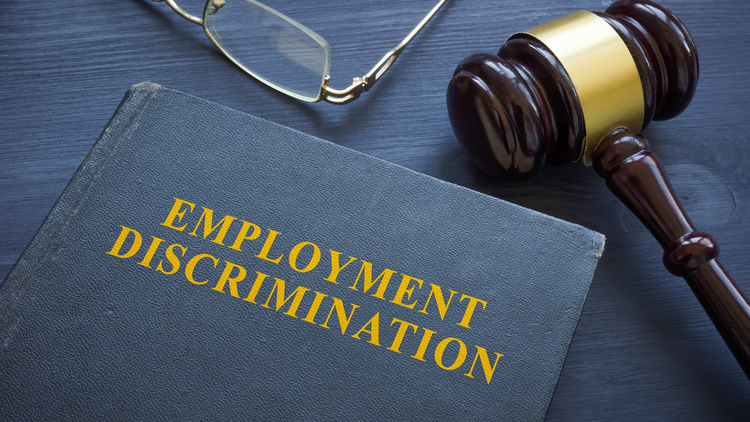
The state also has laws that limit what information employers can ask as part of their hiring practices such as:
- Oregon Fair Employment Practice Act: This law makes it illegal for an employer to discriminate against a person on the basis of race, color, religion, sex (including pregnancy), national origin, marital status, and physical or mental disability.3
- “Ban the Box” Legislation: This law made it illegal for an employer to include a question about criminal convictions on their employment application
- The Equal Pay Act: This law states that employers cannot inquire about previous or current wages and salaries or discriminate based on the earnings of an applicant4
Federal laws enforced by the Equal Employment Opportunity Commission and Title VII of the Civil Rights Act of 1964 it the US prohibit an employer from asking about:
- Arrests that did not result in a conviction
- Dismissed cases
- Expunged or sealed records
- Juvenile offenses
It is worth noting that while there are some types of court records that may be sealed or expunged, you may still be required to disclose previous arrests under certain circumstances. This can also include cases that were dismissed, not prosecuted, or the instances where an individual was found not guilty.
Since there are so many different sources of information about an applicant’s criminal history, it is important for employers to take time and understand their obligations under state and federal laws before making a hiring decision. Asking too much can violate anti-discrimination laws while failing to ask enough questions could leave a company open to liabilities.
Are Your Public Records Accessible With a Criminal Background Check
Who has access to your public records in Oregon and how readily available is your information? Your criminal record is available to the general public, however, law enforcement only has access under certain circumstances. Oregon county agencies have direct access to your personal information without notice or consent. Public record access is also granted through formal requests and legal means such as subpoenas, court orders, and law enforcement investigations.
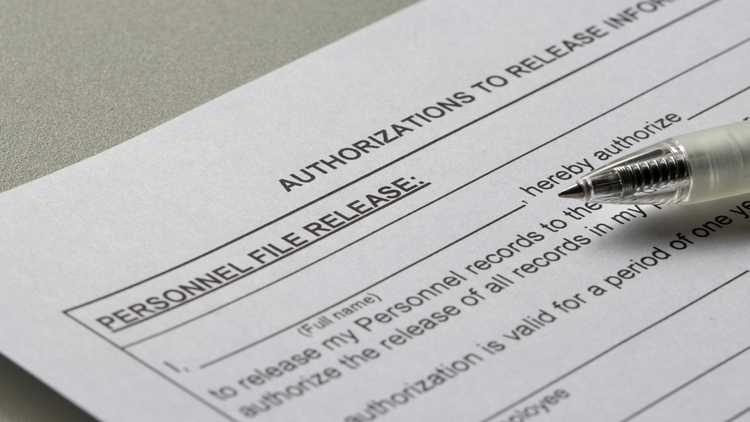
Prospective employers, landlords, or anyone else who requests a criminal background check has access to all of your public records and can learn the reason for someone’s arrest. Anyone can run their own Oregon public records search on the internet, but finding more specific information requires you to file a formal request with the county or get in touch with a law enforcement agency directly.
Oregon offers two primary methods of obtaining sensitive personal data from official sources. These methods include county record checks and an official state central background registry.
The enforcement of Oregon public records laws is handled by the local county clerk of court, but each individual law enforcement agency can choose its own policy for responding to private parties making a request. The availability of your information depends on which specific sources are accessed in a background check.
What Other Information Can Be Obtained?
While you can access public records in Oregon to learn about someone’s past criminal history, you can also find their date of birth, new home address or phone number, and other vital information such as property ownership and delinquent financial obligations. Unlike a private criminal history report, public records do not include any information about traffic violations or other infractions that are considered minor by the state. Each county can also choose to remove your name from certain types of reports for privacy reasons.
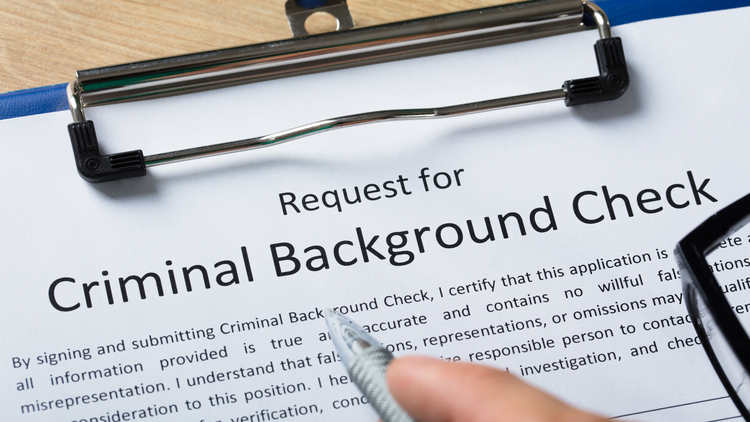
Oregon criminal history reports will include all felony and misdemeanor offenses that resulted in incarceration or conviction. Your record includes outstanding warrants as well as unresolved cases which can be expunged from your report (see ways to exclude criminal history from background check laws in Oregon) once a verdict has been rendered and the required sentence has been served.
Your own state public record is available to the general public as well as law enforcement agencies who have a reason for taking an interest in your background report. So, when asking whether someone can perform a records check on you without consent, the answer is yes, anyone can run a criminal history check on you with the state regardless of whether or not they have your consent, however, you must first be notified. Those who don’t have access to public records may still retrieve information from other sources such as financial institutions or even private companies that gather data about individuals in order to provide consumer reports.
In addition to the enforcement of Oregon public record laws being up to individual counties and law enforcement agencies, the enforcement of your rights to privacy is left up to the individual agencies as well. The only time that an agency must respond when you request the removal of personal information from public records or other sources is when it has been requested by a court order.
When Can I Request Removal?
There are two main methods for requesting the removal of public records, including removing all personal information and the redaction of sensitive personal data.
Oregon public records can be removed from your state criminal history report by making a formal request to the state. You will need to make this request in writing either by mail or by visiting the office in person. Typically you will incur an $80 fee.5 It is important to note that only certain records are eligible for removal. This includes specific types of crimes (typically those not involving violence or physical abuse), nondisclosure of juvenile records, and arrests that did not result in a conviction.
You can also request the redaction of sensitive personal data if you feel it’s necessary to ensure your privacy. If authorities decide that this is appropriate for your situation they will typically submit an affidavit with further information requesting removal from the county record databases. If you are dealing with a specific case where your safety and privacy are at risk, the authorities may consider keeping this information private until the matter is resolved. Check with your local county clerk of court to learn more about this process.
Oregon is a state with many laws that are intended to protect its citizens, which can have an impact on employers. It’s important for companies of all sizes to stay up-to-date on these new rules and regulations. Employers can maintain compliance in their companies by properly navigating these laws and implementing background checks and background searches within their organizations. By partnering with an industry leader in screening and search, businesses can ensure that they are staying current with the changing landscape of employment law. Additional resources are available for background check Oregon by searching online via the state’s official website.
References
1Sussman, Jessica. 2021. May an employer ask a job applicant about current or past illegal drug use? XpertHR. 12 November 2021. Web. <https://www.xperthr.com/faq/may-an-employer-ask-a-job-applicant-about-current-or-past-illegal-drug-use/92/>
2Meneghello, Richard. 21 December 2015. Oregon: Portland Passes Strict New ‘Ban the Box’ Law. SHRM. 12 November 2021. Web. <https://www.shrm.org/resourcesandtools/legal-and-compliance/state-and-local-updates/pages/portland-ban-the-box.aspx>
3BLR. 2021. Oregon Discrimination: What you need to know. BLR. 12 November 2021. Web. <https://www.blr.com/HR-Employment/Discrimination/Discrimination-in-Oregon>
4University of Oregon. N.d. Oregon Equal Pay Act Overview. University of Oregon. 12 November 2021. Web. <https://hr.uoregon.edu/classification-compensation/oregon-equal-pay-act-implementation/oregon-equal-pay-act-overview>
5Scholl, Greg. June 2021. Clearing Your Record. Oregon State Bar. 12 November 2021. Web. <https://www.osbar.org/public/legalinfo/1081_clearingrecord.htm>
